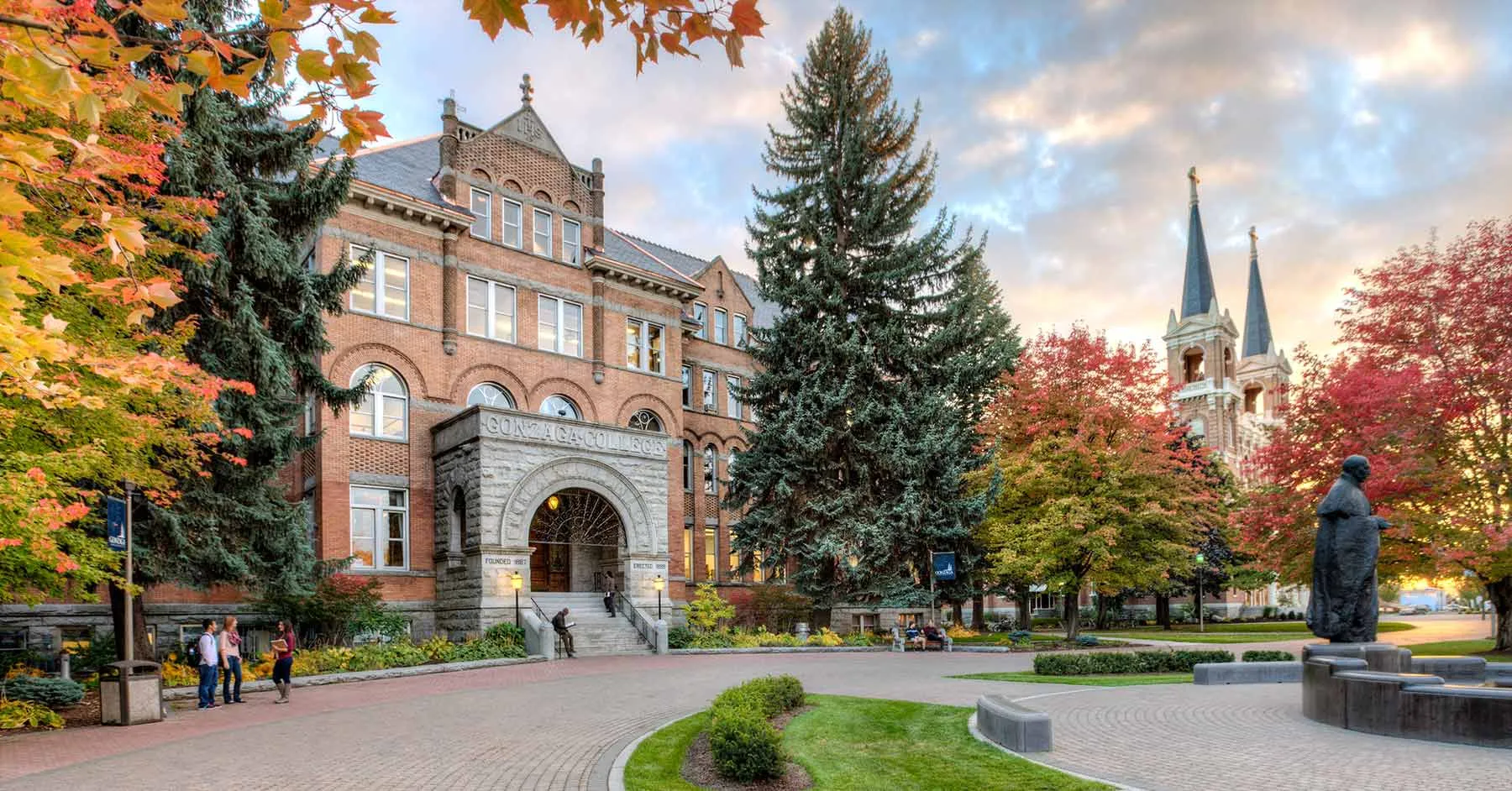Is Gonzaga University A Christian School? Examining Its Jesuit Identity
Gonzaga University is a private university in Spokane, Washington that is well-known for its successful basketball program. But is Gonzaga a Christian university with faith-based values?
If you’re short on time, here’s a quick answer: Yes, Gonzaga identifies as a Christian school, specifically a Jesuit Catholic university. It emphasizes Catholic teachings and faith-based education.
In this approximately 3000 word article, we’ll explore Gonzaga’s history, its Jesuit identity, academics, student life, and alumni to understand its Christian heritage and contemporary mission.
History and Founding of Gonzaga as a Jesuit Institution
Gonzaga University, located in Spokane, Washington, has a deep-rooted history as a Jesuit institution. The university was founded by Italian Jesuit missionaries in 1887, with the aim of providing a quality education rooted in the Jesuit tradition.
The Jesuits, known formally as the Society of Jesus, have a long-standing tradition of promoting education and intellectual growth.
Founded by Italian Jesuit Missionaries
The founding of Gonzaga University can be traced back to the efforts of Father Joseph Cataldo, an Italian Jesuit missionary who arrived in the Pacific Northwest in the late 19th century. Father Cataldo, along with a group of Jesuit priests, established Gonzaga College in order to serve the community and provide education to the region.
These early Jesuit missionaries faced numerous challenges, including language barriers and cultural differences, but their commitment to education and their strong faith allowed them to overcome these obstacles and lay the foundation for what would become Gonzaga University.
Original Mission to Educate Native Americans
One of the primary missions of the Jesuits at Gonzaga was to provide education to Native Americans in the region. They believed that education was a powerful tool for empowerment and sought to uplift the indigenous communities by offering them access to knowledge and opportunities for personal growth.
Through their dedication and perseverance, the Jesuits at Gonzaga were able to establish strong connections with the Native American communities in the area, and many Native American students have since graduated from Gonzaga University, carrying on the legacy of their ancestors who were educated by the Jesuits.
Named After 16th Century Jesuit Saint
Gonzaga University was named after St. Aloysius Gonzaga, a 16th-century Jesuit saint known for his commitment to education and service to others. St. Aloysius Gonzaga dedicated his life to helping the sick and the poor, and his selfless actions serve as an inspiration to the Gonzaga community.
By naming the university after St. Aloysius Gonzaga, the Jesuits at Gonzaga University sought to emphasize their commitment to the values of service, compassion, and intellectual growth that are central to the Jesuit tradition.
To this day, Gonzaga University continues to uphold its Jesuit identity and remains dedicated to providing a holistic education that combines academic excellence with moral and spiritual development.
Jesuit Values and Education at Gonzaga
Gonzaga University, located in Spokane, Washington, is deeply rooted in its Jesuit identity, which influences every aspect of the university’s mission and educational approach. The Jesuits, also known as the Society of Jesus, are a Catholic religious order known for their commitment to education, intellectual rigor, and service to others.
At Gonzaga, these Jesuit values are not just words on a page, but are lived out in the daily life of the university community.
Catholic Teachings Across Disciplines
One of the hallmarks of a Jesuit education is the integration of Catholic teachings across all academic disciplines. At Gonzaga, students are encouraged to explore the intersection of faith and reason, and to think critically about the ethical implications of their studies.
Whether studying the humanities, sciences, or business, students are challenged to consider how their education can be applied to promote the common good and address social justice issues. This holistic approach to education sets Gonzaga apart as a Christian university that values the pursuit of knowledge and the development of the whole person.
Commitment to Service and Justice
Another key aspect of Gonzaga’s Jesuit identity is its deep commitment to service and justice. Students are encouraged to engage in community service and social justice initiatives both on and off-campus.
Through programs like the Center for Community Engagement, students have the opportunity to put their faith into action by serving marginalized communities, advocating for social change, and working towards a more just and compassionate society.
This emphasis on service and justice aligns with the Jesuit tradition of promoting a faith that does justice and empowers students to become agents of positive change in the world.
Emphasis on Contemplation and Discernment
Jesuit education places a strong emphasis on the development of the whole person, including their spiritual life. At Gonzaga, students are encouraged to cultivate a reflective and contemplative approach to life, seeking to discern their purpose and calling.
Through retreats, spiritual direction, and opportunities for prayer and reflection, students are supported in their spiritual growth and encouraged to deepen their relationship with God. This emphasis on contemplation and discernment helps students to develop a sense of inner peace and clarity, enabling them to make decisions that align with their values and contribute to the greater good.
Religious Offerings for Christian Students
Gonzaga University, as a Jesuit institution, places a strong emphasis on providing a rich spiritual environment for its Christian students. The university offers a variety of religious offerings that aim to deepen students’ faith and encourage their spiritual growth.
Theology Courses and Campus Ministry
One of the key ways Gonzaga supports its Christian students is through its robust theology curriculum. The university offers a wide range of theology courses that explore various aspects of Christian faith, biblical studies, and religious history.
These courses not only provide students with a solid foundation in Christian theology but also encourage critical thinking and engagement with their own faith.
In addition to theology courses, Gonzaga also has a vibrant campus ministry program. The campus ministry team organizes retreats, prayer groups, and spiritual formation programs, creating opportunities for students to deepen their relationship with God and connect with fellow believers.
This ministry plays a vital role in nurturing the spiritual lives of Christian students on campus.
Weekly Mass and Religious Services
Gonzaga University recognizes the importance of communal worship and offers weekly Mass services for Christian students. These services, held in the university’s beautiful chapel, provide students with a space to come together and worship as a faith community.
The Mass is celebrated according to the traditions of the Roman Catholic Church, reflecting Gonzaga’s Jesuit identity.
Furthermore, Gonzaga also accommodates students from other Christian denominations by offering interdenominational services and opportunities for Christian fellowship. This inclusivity enables students of different Christian backgrounds to come together and celebrate their shared faith.
Pastoral Leadership and Chaplaincy
The presence of pastoral leadership and chaplaincy is another significant aspect of religious offerings at Gonzaga. The university has dedicated chaplains who provide spiritual guidance, counseling, and support to students.
These chaplains are trained to address the unique spiritual needs of young adults and help them navigate their faith journey during their time at Gonzaga.
Additionally, the chaplains collaborate with student-led religious organizations to facilitate events and activities that foster a strong sense of community and spiritual growth. They serve as mentors and resources for Christian students, offering guidance and fostering an environment where students can explore and deepen their faith.
Christian Identity Within a Diverse Student Body
Gonzaga University, a Jesuit institution, has a strong Christian identity that is deeply rooted in its Catholic tradition. However, the university’s student body has become increasingly diverse in recent years, with a growing number of non-Catholic students joining the community.
This diversity has raised questions about how the university’s Christian identity is maintained and expressed within such a diverse environment.
Growing Number of Non-Catholic Students
While Gonzaga University was founded as a Catholic institution, it has always welcomed students from diverse religious backgrounds. In recent years, there has been a noticeable increase in the number of non-Catholic students enrolling at the university.
According to the latest statistics, approximately 30% of the student body identifies as non-Catholic, representing a wide range of faith traditions including Protestantism, Judaism, Islam, and Hinduism.
This diversity brings a richness to the campus community and fosters opportunities for interfaith dialogue and understanding.
Interfaith Groups and Religious Inclusion
Gonzaga University recognizes the importance of fostering a welcoming and inclusive environment for students of all faiths. The university has established interfaith groups and organizations that provide a space for students to explore and celebrate their own religious traditions while also engaging in dialogue with others.
These groups organize various events, such as interfaith prayer services, panel discussions on religious topics, and community service projects that promote understanding and collaboration among students of different faiths.
Additionally, the university offers courses and programs that promote religious literacy and interfaith dialogue. Students have the opportunity to learn about different religious traditions and explore the intersections between faith, culture, and social justice.
These initiatives reflect Gonzaga’s commitment to nurturing a diverse and inclusive community that values and respects religious diversity.
Debate Over Contraception Coverage
One area where Gonzaga University’s Christian identity has been subject to debate is its stance on contraception coverage for its employees. As a Catholic institution, the university follows the ethical teachings of the Catholic Church, which prohibit the use of artificial contraception.
This means that the university’s employee health insurance plans do not cover contraception.
However, this policy has faced criticism from some members of the Gonzaga community who argue that it restricts access to essential healthcare services and infringes upon the reproductive rights of employees.
The debate over contraception coverage highlights the tension between the university’s commitment to its Christian identity and the need to accommodate the diverse needs and beliefs of its community members.
It is important to note that Gonzaga University’s Christian identity is not static, but rather an ongoing conversation and exploration within the context of a diverse student body. The university strives to balance its Catholic heritage with a commitment to inclusivity and respect for all faith traditions.
This ongoing dialogue and commitment to religious diversity make Gonzaga a unique and vibrant community for students of all backgrounds.
Conclusion
In conclusion, while not without complexity, Gonzaga University clearly identifies itself as a Christian, Jesuit Catholic university. Its mission, values, academics, and campus life are all profoundly shaped by its religious heritage.
Yet Gonzaga also strives for interfaith dialogue and reaching those of diverse beliefs, demonstrating how Christian identity can thrive within a modern educational institution.








